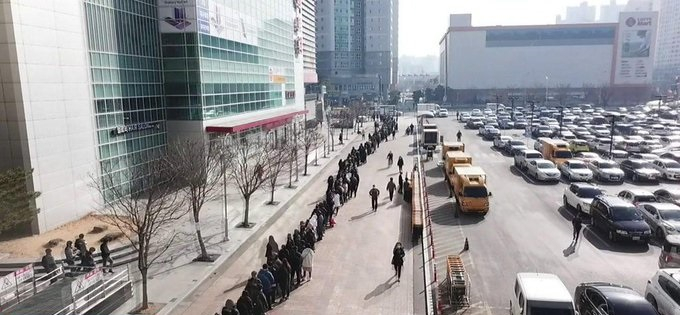The health authorities of South Korea stated on Thursday that they will revise the practice of publicizing the travel routes of the coronavirus or COVID-19 patients because of the fears of a backlash against the people who attended the nightclubs at the center of the new outbreak.
Following weeks of almost no brew domestic cases of the novel virus in the country, South Korea witnessed a new spike in the infection that is centered around the nightclubs and bars in a few of Seoul's most happening nightlife neighborhoods.
South Korea tackling new Coronavirus cluster

Investigators have struggled to find around 2,000 people wanted for testing, an effort complicated by public criticism of the clubgoers, as well as concerns about discrimination as several of the clubs cater to members of the lesbian, gay, bisexual, transgender and queer (LGBTQ) community.
While clubs and bars were required to log the names and contact phone numbers for all visitors as a condition of reopening, much of the information turned out to be incomplete or false, officials said. That has left officials combing through cellphone location data and CCTV footage to try to identify some customers, while publicly pleading for people to come forward and be tested.
Officials say they understand some individuals may fear social stigmatisation and have promised to try to reduce the amount of information usually released about confirmed patients. South Korea has typically released information like a patient's age, gender, and places visited immediately before testing positive, as well as in some cases, patients' last names and general occupations.
About 2,500 people are still being sought by officials. "In the long-term war with COVID-19, stigma and discrimination will only hide patients and create a favorable condition for this virus," Kwon Jun-wook, deputy director of the Korea Centers for Disease Control and Prevention (KCDC) said at a briefing. "Avoiding a test because of fears of social bias and criticism can damage our entire community."
In response to the privacy concerns, health authorities have expanded anonymous testing nationwide, Vice Health Minister Kim Gang-lip said at a meeting of health authorities on Thursday, according to his office. "In addition, we plan to revise the guidelines to prevent excessive disclosure of a patient's travel itinerary." People who ignore calls to be tested can face a fine of up to 2 million won ($1,630), health ministry official Yoon Tae-ho told a briefing.
NEIGHBORHOOD TAKES A HIT
South Korea reported 29 new cases as of midnight Wednesday, bringing the country's total to 10,991 with 260 deaths. Of those new cases, 20 were linked to the outbreak from the clubs in Seoul's Itaewon neighborhood. A total of 133 cases have been linked to that outbreak, including clubgoers as well as secondary infections in family members, coworkers, and students.
The streets in Itaewon were unusually quiet on Thursday. Some shops had signs announcing temporary closures, and the entrances to some bars and karaoke clubs bore notices from the Seoul municipal government informing on the city's reinstated ban on large gatherings at such businesses.
"There were a lot of clients heading to Itaewon even up until last week," Choi Seok-soo, a longtime taxi driver, told Reuters. "People would go there at 10, 11 p.m. - until 1 a.m. in the morning on weekends. But since the outbreak, no one wants to go there."
Kim Chang-hyun, who runs an antique shop in Itaewon, said the business situation is the worst he's seen in decades. "I've been working here for the last 33 years and have endured the IMF crisis and the financial crisis," Kim said. "But the situation now is worse than it was back then."
The cluster of infections in Itaewon and other nightlife spots came as the country was easing social distancing guidelines, and the cases led to public criticism of both the clubgoers as well as health officials who allowed the clubs to reopen. "I think the authorities missed these venues," said Kim Dong-hyun, president of Korean Society of Epidemiology. "They had grounds to suspend operations of the facilities earlier, but it's unclear why they didn't."
(With agency inputs)









